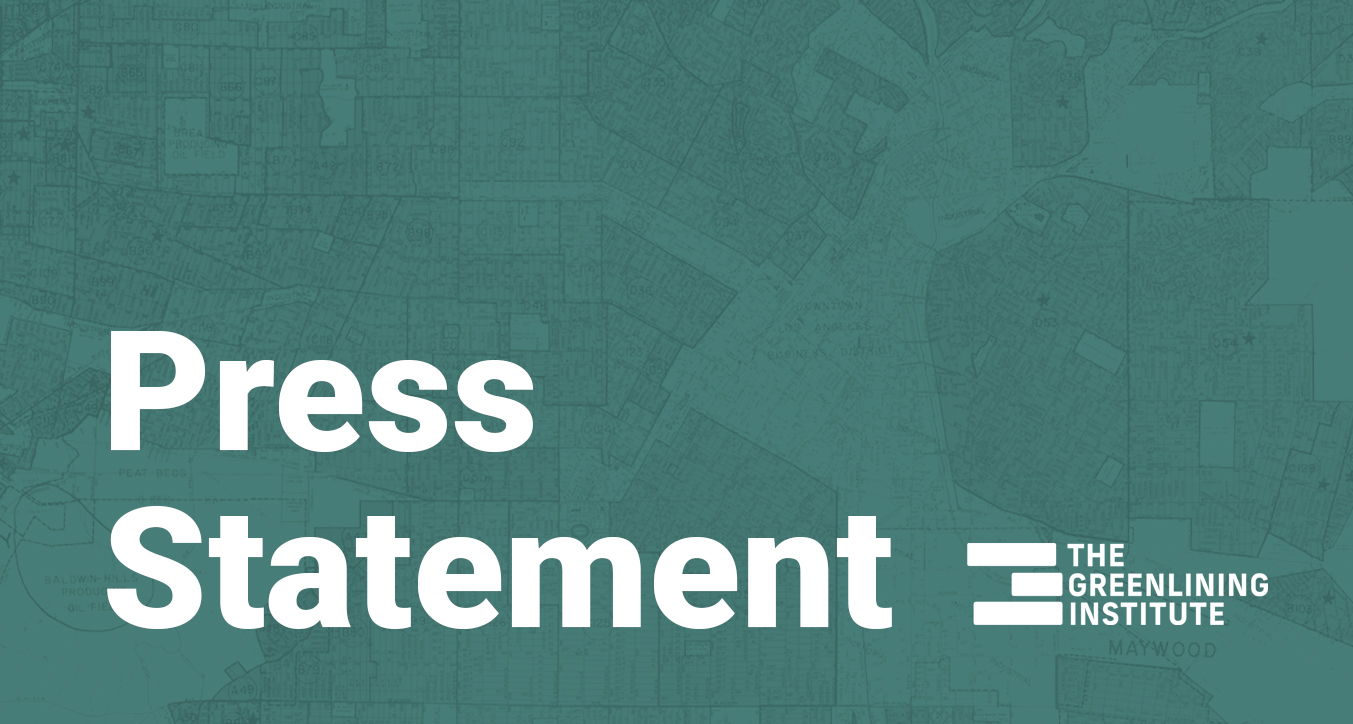2023-2024 California Budget Proposal Includes Hard Cuts to Protect Basic Needs Ahead of Economic Uncertainty

Media Contact
Danielle Bell
SENIOR PROGRAM MANAGER FOR MEDIA RELATIONS
media@greenlining.org danielle.bell@greenlining.orgThe Greenlining Institute urges legislators to secure long-term funding for scaled back equity programs to protect them from future economic volatility
(Oakland, CA)–Governor Newsom’s 2023-24 California Budget proposal previews a rocky road ahead due to lower-than-anticipated state revenues and ongoing economic uncertainty as the threat of a recession grows. California currently faces a $22.5 billion deficit, in stark contrast to the state’s historic $100 billion surplus last year.
Economic downturns have the harshest impacts on low-income communities that are already struggling to make ends meet, which is why we’re encouraged to see continued investments in areas like healthcare, education, and housing. However, proposed Budget cuts and funding delays in areas like infrastructure, clean transportation, affordable housing programs, and climate resilience will undoubtedly slow the state’s progress toward making equity a reality for all Californians, and not just the wealthy few.
“Already underfunded equity programs that support communities of color and low-income communities should be protected all the time, but particularly during Budget deficit years. Economic cycles are unpredictable, which is why it is so essential to prioritize communities that face the most severe consequences of economic downturns. We urge legislators to start work immediately on progressive revenue proposals that create a consistent source of funding to advance climate equity, affordable housing development, and broadband deployment–programs that can help close the racial wealth gap,” said Alvaro Sanchez, Vice President of Policy at The Greenlining Institute.
“As leaders of the fourth largest economy in the world, California lawmakers have a responsibility to invest in statewide resilience so our communities don’t fall further behind,” Sanchez continued. “We appreciate the Governor’s commitment to protect the state’s most vulnerable by maintaining key investments in healthcare, homelessness, and education. This Budget proposal reflects our flawed economic system, in which the wealthiest few are able to accumulate immense amounts of wealth while millions slip into poverty and rely on a sparse government safety net to make ends meet.”
Key investments outlined in the proposed Budget include:
- Investment in the California Racial Equity Commission. The Budget includes $3.8 million in 2023-24, and $3.1 million through 2028-29 in the General Fund to support the state’s first Racial Equity Commission established by Executive Order last year.
- Continued investment in the State Small Business Credit Initiative (SSBCI). With over 320,000 small businesses already receiving grants for COVID-19 relief, the Budget includes $6 million in 2022-23, and $26 million ongoing investments for technical assistance, and $8 million in one-time funding to support women-owned businesses. In light of economic uncertainty, this ongoing investment remains critical as the state delivers more loans to support businesses still recovering from the economic impacts of the COVID-19 pandemic. We look forward to learning more details on how the state will ensure these investments reach communities of color and low-income communities that need them the most.
While the Budget sustains a multi-year commitment of $44 billion in state funds for infrastructure investments, it also proposes a reduction of $3.9 billion in critical spending that includes climate and transportation investments for the 2020-21 and 2023-24 fiscal years. Such funds are said to be restored if costs are deemed sufficient to cover previous commitments.
Potential cuts and delays outlined in the proposed Budget include:
- Reductions to Affordable Housing Programs. The Budget includes $350 million in General Fund reductions related to housing programs that were included as part of the 2022 Budget Act. Despite these reductions, approximately $2.85 billion remains intact based on the commitments made for the 2022-23 and 2023-24 fiscal years. The Greenlining Institute supports prioritizing housing investments, and opportunities that aid in meeting the state’s 2.5 million production goal by 2030, one million of those units being affordable housing.
- Delayed funding for Equitable Building Decarbonization. $370 million in funding for building decarbonization will be delayed for this, and future years. This includes an additional reduction of $87 million planned for 2025-26 that directly supports projects aimed at reducing greenhouse gas emissions in homes and advancing energy equity.
- Reverting funds for the California Arrearage Payment Program. The Budget reverts $400 million put in place to provide relief to struggling households suffering from large amounts of utility debt. We recommend that the Legislature preserves this funding and implements program design changes such as requirements for utilities to provide more tailored technical assistance and support to increase the reach of these funds.
- Reductions and delays for climate initiatives.
- A reduction of $65 million in 2022-23, and $40 million in 2023-24 for the Transformative Climate Communities Program that empowers communities that are most impacted by pollution the ability to choose their own goals, and projects to reduce greenhouse gas emissions, and improve local air quality.
- No funding for Regional Climate Collaboratives, and a $85 million delay in Community Resilience Centers investments, ultimately weakening efforts to bolster community capacity to combat and withstand climate change impacts.
- Transportation Trigger Reductions. Trigger reductions include cuts to transportation initiatives aimed at expanding mobility and reducing harmful emissions. With transportation serving as the backbone of a healthy economy, and a key component of meeting the state’s ambitious goals for reducing emissions, we hope to see these programs receive much needed funding through federal programs. Reductions include:
- A net reduction of $200 million for the Active Transportation Program that expands opportunities of active mobility, such as walking and biking.
- An overall $1 billion in reductions over the next three years across various zero- emission vehicle programs related to heavy-duty zero-emission vehicle (ZEV) infrastructure supporting transit, school buses and port ZEVs , zero-emission mobility delivering community-based transportation projects, and equitable zero-emission vehicles ensuring accessibility across low-income neighborhoods.
In an effort to offset trigger reductions, the state will lean on potential incoming federal commitments through the Infrastructure Investment and Jobs Act to secure up to $15 billion to aid statewide transportation infrastructure, including existing and new programs for transit, and highway safety. It is critical to our work at The Greenlining Institute to advance these federal funding efforts, and what remains of statewide allocations, to deliver concrete benefits to our communities.
“As we have for the past three decades, The Greenlining Institute will continue to fight for initiatives that build resilience through economic shortfalls and instability,” said Melanie Morelos, California Strategy Senior Program Manager. “We look forward to working alongside the State Legislature, Administration, and our partners as we advocate to strengthen our social safety nets in times of economic distress, and build an economy where communities of color can thrive.”


